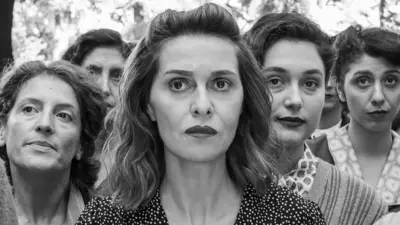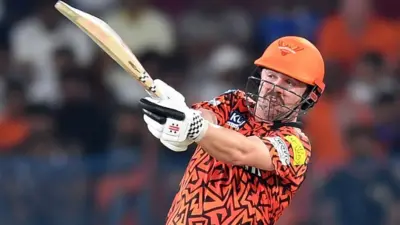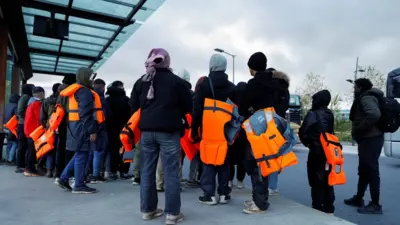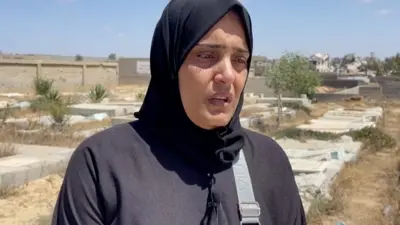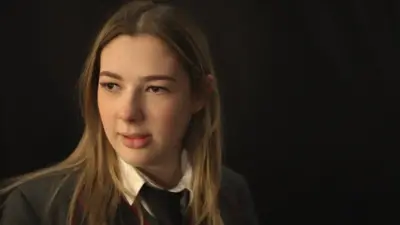We've updated our Privacy and Cookies Policy
We've made some important changes to our Privacy and Cookies Policy and we want you to know what this means for you and your data.
Booker Prize 2021 shortlist: 'Absorbing global stories of life and death'
Image source, The Booker Prizes
Novels set in Sri Lanka and South Africa, Cardiff Bay and the outer cosmos are among those to have been nominated for this year's Booker Prize.
The chair of the judges said choosing the six "immersive" books had felt "transporting in a year when so many of us have been confined to home".
The list includes three American writers and, for the second year in a row, only one British author.
The longlisted authors who missed out included Nobel laureate Kazuo Ishiguro.
The novelists who did make the cut include Pulitzer Prize-winning American writer Richard Powers and Damon Galgut, from South Africa, who has been nominated for the Booker twice before.
Image source, Getty Images
The prestigious British-based £50,000 award is open to any authors writing in English, and the scarcity of UK authors was "just a coincidence", according to one judge.
"While judging the Booker Prize we look at not just what the writers are saying but how they are saying it, and therefore nationalities do not really matter," said Chigozie Obioma, who is on the panel six years after being shortlisted twice himself.
Last year, the sole British representative, Douglas Stuart, went on to win. This year, British-Somali Nadifa Mohamed is nominated for her third novel The Fortune Men.
The nominees in full:
- Anuk Arudpragasam - A Passage North. In his second novel, the Sri Lankan author explores the lasting effects of the trauma and violence of his country's civil war, and a past love affair. "We felt that he was taking on with great seriousness this question of, how can you grasp the present, while also trying to make sense of the past?" said judge Horatia Harrod.
- Damon Galgut - The Promise. The South African writer's ninth novel follows a white family over the decades from the Apartheid era. "The ultimate question that the novel asks is, is justice - true justice - possible in this world?" Obioma said. "If it is, then what might that look like?"
- Patricia Lockwood - No One Is Talking About This. This is the first novel by the American poet and memoirist. It follows a woman catapulted to social media fame, told using what Booker judge Rowan Williams described as the "unpromising medium of online prattle". When reality impinges on this online existence, it ends up being a story "with intense, emotional energy and truthfulness", he said.
- Nadifa Mohamed - The Fortune Men. Mohamed was born in Somaliland and raised in Britain, and her book is set in the docks of post-war Cardiff Bay. It fictionalises the story of Mahmood Mattan, a real Somali sailor who was wrongly accused of murder. "This is a story about the past that has great significance for the present," said judging chair Maya Jasanoff.
- Richard Powers - Bewilderment. The US author won the Pulitzer for his last novel The Overstory. Here, a widowed astrobiologist turns to experimental treatments to help his nine-year-old son with additional needs - and take him to other planets. It is "a clarion call for us all to wake up and realise what our minds might be truly capable of if we were less obedient to the status quo," judge Natascha McElhone said.
- Maggie Shipstead - Great Circle. Another American author, Shipstead's third novel intertwines the stories of a daring post-war female pilot and a 21st century Hollywood actress who is trying to rescue her reputation by making a film about her. It "speaks to ever-present questions about freedom and constraints, particularly in women's lives", Jasanoff said.
Jasanoff explained: "Our shortlist is immersive - stories that you can get absorbed in, voices that get inside your head, which feels quite reflective of the experience of reading in lockdown.
"Our shortlist is global - in their authors and their settings - which feels transporting in a year when so many of us have been confined to home.
"And our shortlist engages with matters of life and death, which feels quite poignant and pertinent in this catastrophic year.
'Books you will actually want to read'
Analysis by BBC arts correspondent Rebecca Jones
I like this list. It is serious, not showy, but features books you will actually want to read (and will enjoy) rather than books you feel you ought to read (and might not enjoy).
Take Maggie Shipstead's Great Circle, an enthralling epic about aviation and adventure. It is a big, baggy blast of a book bulging with sex and drugs, taking in Prohibition-era Montana, wartime Alaska, present-day Hollywood, painting and physics. I loved it.
Then there's the entertaining debut from Patricia Lockwood, No One is Talking About This. Written in fragments, mirroring posts on social media, it initially appears stylistically experimental before becoming a much more conventional and poignant story.
Anuk Arudpragasm's A Passage North is the most challenging book and some readers may find it frustrating. It is written in long paragraphs, with lengthy sentences and not much dialogue. It is more of a philosophical meditation on memory and trauma than a page turner perhaps.
I am glad Richard Powers' Bewilderment has made the shortlist, as much as anything because I thought The Overstory should have won the Booker in 2018. Bewilderment explores the environmental crisis, which will strike a chord with many readers.
The Promise by Damon Galgut is an exceptional book, beautifully written with characters you come to care deeply about. The promise of the title is not only the deathbed wish of a white woman to leave a house to her black housekeeper, but also the unfulfilled promise of post-Apartheid South Africa. Having been shortlisted twice before, it could be third time lucky for the South African writer.
That leaves Nadifa Mohamed's historical novel The Fortune Men, which I am yet to read. But from what I have heard it is an engrossing story based on real-life events in 1950s Cardiff. On the basis of the other books shortlisted for the prize this year, I can't wait to get started.
- 2021 BAFTA CYMRU NOMINATED: Watch the cream of the crop
- ARTS AND HERITAGE: Lose yourself in Welsh creativity and culture
Top Stories
Features & Analysis
Most read
Content is not available

